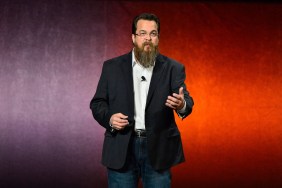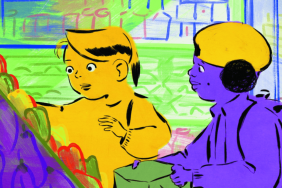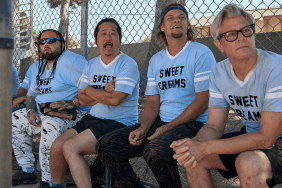
SHOCK is proud to present this interview with the late, great filmmaker Wayne Crawford.
A true independent filmmaker who always saw himself as a leading man, Wayne Crawford wrote, produced, directed, and starred in a number of projects, several of which became bona fide cult films and even fan favorites. He started out scrounging around for work, and quickly aligned himself with a writing and producing partner named Andrew Lane, whom he would collaborate with on his most memorable and money-making projects, including writing the now-classic ’80s classic VALLEY GIRL and producing the post-apocalyptic cult film NIGHT OF THE COMET, which has gone on to become a much-beloved movie for many fans of the genre. Crawford then co-wrote and produced the biggest film he would ever star in, a delightfully weird action/fantasy hybrid called JAKE SPEED. Filmed on location in South Africa, that film would change the course of Crawford’s destiny, as he fell in love with the continent and would live there for many years, making independent action films and televisions series.
Sadly, Mr. Crawford passed away on April 30th, 2016, but this interview, which was conducted in 2010 while he was teaching in Singapore, details his entire career, and he left behind a legacy to be proud of.
SHOCK: How did you get started in your early years? What was your introduction to the movie business?
CRAWFORD: I’m originally from upstate New York, a very tiny town. It wasn’t a hotbed for creative activity. Where I grew up Art is what you named your son. I had no connections to the movie business. When I went to university, it was a pure fluke that I ended up being a theater major. I remember the point when I went to see The Graduate when I was in university. It was ’67, I think. There were morning shows of the movie, and I went to one of those, but I didn’t come out until the theater closed at midnight. I was mesmerized by this movie. I said to myself that I wanted to make movies. No one was teaching me how to make films or anything like that. I had a buddy who was an artist, and I convinced him to make movies with me. This is a true story: I sold most of my personal effects and probably raised some money and we went to a pawnshop and bought a Bolex camera. The light meter promptly broke. We started out making some short films. I knew so little about it that for a while I didn’t even understand that no matter how loud we were speaking we just couldn’t hear the sound! Not knowing that we needed a separate device to record the sound! (Laughing.) That’s what kind of a moron I was. So we made silent movies for awhile. That’s how it started. When I graduated university, I was trained to be an actor, and I was like all serious actors and I went to New York and I quickly found out that everything was casting out of New York. I didn’t really need to leave town. I started working rather quickly. It was not that satisfying. There were more actors making more from unemployment than I was making working as an actor. It didn’t matter because I was actually working. One thing led to another and I was doing a performance for something and some guy approached me and said, “I’m going to make a movie and I want you to be in it.” I said, “Ehhh, okay.” Things are not always as they seem in this business. I was polite, and said, “Call me.” About a year later, I had an agent, a very sweet lady, who said, “This guy has called and he wants you to be in his movie.” I said, “You mean he wants me to audition?” She said, “No, he says it’s yours.” I said, “Wow.” That’s when I got the role for this little movie that was never released. Or maybe it was released in a few places. It was very weird. The movie was really not … what started out as a four-week shoot ended up taking about 16 weeks. It was my longest continuous employment in show business. I met some people on that who would become very instrumental in my career. The movie was called Sometimes Aunt Martha Does Dreadful Things, and it was directed by a man named Thomas Casey. The production manager was a guy named Harry Kerwin, and he turned out to be the most influential person in my entire career. He became my mentor for many, many years. He taught me a lot of things about movies, about character, and he was a great man. He’s gone now. We shot it in South Florida. The director showed a reel of the film to some people, and that got me a role on an episode of something, and he got me a job working for a commercial production company. That’s where I learned some things about production. Little did I know that there would be another guy there at that company who I would become friends with and also wanted to make movies. That was Andy Lane. So I was getting experience and I didn’t realize that Andy and I would be production partners for over 20 years. And we’re still very close. Andy decided one day that we would make a movie, but I don’t know how we got to this figure, but we got to this number that we needed a hundred and fifty thousand dollars to make a movie. It might as well have been a hundred and fifty million. That was a lot of money. We did what I would caution all young filmmakers to do: We had paying jobs in the business and we promptly quit our jobs because we were sure we were going to make a movie. Now, that was slightly moronic, but it does turn the temperature up a little bit because we went out to raise money because we’d quit out jobs. (Laughing.) It was a comedy of errors. Eventually, I was so broke that I had to take a job as an assistant editor in New York. I left Miami, and Andy met lots of people who he was trying to convince to give us money, but it was always the same question: “How do we know you can make a movie?” I had written a script with another guy, and I thought it was pretty decent at the time, but a few months after I came to New York, we’d gotten a few guys interested. Some guys told us, “We’ll give you five thousand for post-production if you ever shoot the movie.” When Andy called me, he said, “Well, my grandmother will give me X amount, and this other guy will give us this amount.” It totaled $20,000. We were looking for $150,000. We had 20. Andy said, “What do we do?” I said, “Well, if we wait for when the time is right, we’ll never make it. So let’s just do it for 20!” We got a cast in New York. It used to be that retired New York people would go to Florida in the winter, and they would fly there, and they would have somebody drive their vehicle to Florida. You would get free transportation, and that’s how we drove the cast to Florida to shoot the movie. (Laughing.) We camped out on the floor of Andy’s apartment while we were shooting the movie. Everyone in the crew was much older than me, and I would always say, “I’m going to make movies one day.” They were wonderful to me. The movie was God’s Bloody Acre. Those people are all gone now. They would say, “Sure, kid. Just call me when you get something going!” I’m sure they thought nothing would ever happen. But I remember later on when I was abut to make Cheering Section, I called the DP Billy Bush, and I said, “Billy: I’m making a movie! Are you ready to shoot it? But I don’t have much money!” He said, “Well, how much do you have?” And at this point, I had no idea how much anybody made in the business. I said, “Well, I can give you $100 a week.” These guys were union guys, they’d worked in Hollywood, and there was this long pause. He says, “Well, how long do you think it’s going to take?” I said, “Four weeks?” A longer pause. And so I said, “I can give you a piece of the movie too!” He was like, “Okay, whatever.” That was a coup because he had so much experience. He was being a real mensch by saying yes. As an afterthought, I said, “And you have your own equipment too, dontcha?” (Laughing.) “Bring that with you, will ya?” (Laughing.) He was touched by my innocence. We had to drive that equipment from New York to Miami! I was clueless. I had the presence of mind to hire Harry Kerwin to direct God’s Bloody Acre and Cheering Section. So that’s how it all started. There was no video in those days. You made movies for walk-in theaters or the drive-in. Those got substantial drive-in releases. We actually all made a little bit of money. We made enough money, that I thought, “My God! This is one of the best-kept secrets of the world! This is easy!” If we’d gotten our asses kicked the first time, I might have thought differently and thought to go to law school. We had a little bit of luck. That movie – God’s Bloody Acre – is referred to as “Hicksploitation.” It was a fun film, and you had to start somewhere. We also did a revenge movie called Deadbeat.
SHOCK: At this point did you think to yourself that you were bound for bigger and better things? Was rolling right into the next project a natural response for you and Andy Lane?
CRAWFORD: I thought that I was doing what I wanted to do. I made a movie without Andy that was slightly bigger, and then I made a movie in ’77/’78, which sort of got me to Los Angeles. It was a film called Barracuda. I was the lead actor on that one. I wanted a big part, so I wrote it for myself. I started directing a little bit on that film. I did all the underwater stuff. That movie actually cost around 200 grand, or something. It actually got a big audience in theaters all over. It helped me because it got out there in a bigger way, and because of that I moved out to Los Angeles, which was the start of the next phase. It took four years to get the next film going, though. The next one was the one that changed my life.

SHOCK: Valley Girl. It’s an awesome movie, man.
CRAWFORD: Thank you. Andy and I wrote it together. We’d been separated for a couple of years, and he still wanted to make movies. It’s a funny thing, but it’s all about meeting people and creating favorable impressions. People get impatient for jobs, though, because they treat it like it’s hunting. It’s not hunting, though, it’s farming. You’re planting seeds. Things eventually sprout. That’s why you have to keep doing it all the time. You can’t just go out there and kill the beast and drag it home. That’s unlikely to happen. Things take longer than you think. So, anyway, Andy and I got the idea of Valley Girl, and we wrote the script, and it was a great day for the director Martha Coolidge. We started her career. It started Nicolas Cage’s career. We didn’t make the money we should have made, but it didn’t matter because we were the guys who did that. Of all the thing I’ve ever done, more people know Valley Girl than anything else.

SHOCK: After your previous films, Valley Girl seemingly came out of nowhere from you guys. Where did the idea for that film come from?
CRAWFORD: We were always trying to do something that would sell. The business at the lower end – all these movies are exploitation, but in slightly different genres – we were just trying to keep our fingers on the pulse of the market. We were pretty good writers and could write funny. We could write anything. We’ve never had trouble finding material. There’s no shortage of shit scripts out there, and it’s not really productive to sift through them. If you’re really flying by the seat of your pants, and if you have a brain and can think, you can come up with something that sells. Andy and I wrote something on spec called Miami Beach, and it was going to be a teen comedy. The distributor wasn’t too enamored with it. Once you have an idea, it’s out there. Lots of people spontaneously have the same idea even though you don’t know them. Ideas can come to a lot of people at the same time. There was this idea that there were people who lived up the hill, and those who lived in the valley. I think we got the idea just before Frank Zappa’s daughter did a song about it. We started this just before that, and as a matter of fact, I think they tried to sue us over it. They didn’t prevail because it was obvious that you couldn’t own a cultural thing. Valley Girl has been out there for a long time. It was a phenomenon. How are we going to treat it? Well, let’s just do a simple riff on Romeo and Juliet. It started out as a one-line description that became the catch-line for the movie. “He’s cool, she’s hot, she’s from the valley, he’s not.” We had that from the very beginning. That was our touchstone for the entire script. We wrote the script, and I was doing some other things to pay the bills, and Andy still had a gig to pay the bills. We worked at night on the script at Andy’s house, and we wrote it in 10 days. We shot the first draft. The rest is history.

SHOCK: Night of the Comet was another classic cult film you and Andy collaborated on. How did that one come about?
CRAWFORD: A year later, we produced Night of the Comet, and I believe it did more business than Valley Girl. Not a lot more, but it did more. Valley Girl, though, became part of the pop culture. Andy and I will always have the fact that we helped bring about the parasitic word “like” to the world. I know young people who can use “like” seventeen times in a sentence. It wasn’t really part of the vocabulary before then. When we made Night of the Comet, we also helped out the careers of other people like the director, Thom Eberhardt, who wrote the film. I think we did a lot for Cathy Stewart and Kelli Maroney. I thought Kelli was going to be a much bigger star because she was very talented. She was pretty adorable. I thought, “This kid is going someplace.” Andy and I were on this as producers, and we helped Thom. In addition to producing it, our big contribution was going through Thom’s 160-page script. 160-page exploitation script, and Kelli’s character gets killed. She died in the first act. We said, “Thom, there’s a lot of really charming stuff here, but you gotta work on this.” Thom has a great sense of humor and he’s an original in lots of ways. We set him up in a little office in our offices, and he came in every day and he wrote and rewrote Night of the Comet. We were functioning, more or less, as editors. We were giving him notes, and told him how to move things around. To his credit, he listened to the notes, and he incorporated most of it. Every word was written by Thom. He made a lot of sense to our notes. We got the script into what you see. It’s a very charming movie. It’s got so many things going for it. It’s a movie about the last two teenagers on earth. It’s pretty clever. We cast it well. Interestingly enough, the people we did it for – the distribution company – really wanted to do it, but they were not convinced that Thom was the guy to direct it, but the more we worked with him, the more convinced we were that he was absolutely the guy to direct it. It was his sense of humor. We spent a significant amount of energy protecting Thom’s position. We knew that it wasn’t going to be the same movie without him. The same thing happened with Martha Coolidge on Valley Girl. The distributor didn’t want her. She’d never made a movie – she’d made half a movie. At the time, I think she’d only made a documentary about rape. Andy and I started to get feedback on the script for Valley Girl, and we saw some great feedback on it. It was a teen comedy. What would make it edgier was to find a woman to direct it. There was only one out there working at the time – Penelope Spheeris – and we went for her, but we found Martha, and we went for it. The distributor thought we were crazy. The distributor held back some of our measly fee so that we could pay the new director after they fired Martha. As it worked out, Martha did a very capable job. Valley Girl was as close to being off the page as you’ll ever see. She had a good blue print to work from. We found ourselves having made these two independent movies back to back that did millions of dollars worth of business. Things really changed for us at that point.

SHOCK: How did you end up with Thom’s script for Night of the Comet?
CRAWFORD: It actually came to us from the distributor. Somebody over there sent it to us and said, “Hey, I think there’s something here.” It was designed to be a low budget exploitation genre movie. It needed to be like 90 pages or something. But it was way too big and not fully formed. We looked at it and said, “Well, I think we can work with this.” So we decided to meet Thom and see how he was to work with. He certainly won us over. He did a wonderful job.
SHOCK: Both Valley Girl and Night of the Comet have fantastic soundtracks full of songs that were of the era. Any comment about these great soundtracks?
CRAWFORD: We had a wonderful music coordinator. I even wrote one of the songs on Night of the Comet. Valley Girl ruined it for a lot of people in terms of getting really cheap music. With that one, we broke a lot of songs like “Electric Avenue,” which became a hit, and we broke “I Melt With You” by Modern English. That song went to number one when the movie came out, and then it went back to number one when the movie premiered on cable. We got these songs for not a lot of money because people didn’t know there was much money in it. After that, getting songs these good became much harder.
To be continued…









